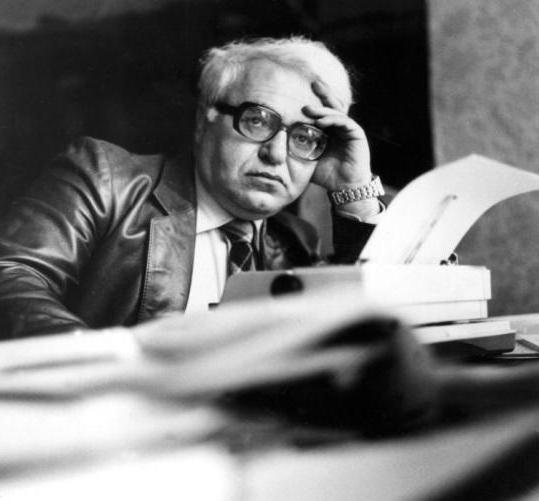Shatrov Mikhail Filippovich is a famous Soviet writer, whose name is associated with an entire era of Russian drama. His plays are dedicated to the life of the country during the period of revolution and the Civil war and fully convey the romance of the past time with all its difficulties and contradictions.
“July Sixth”, “Day of Silence”, “Dictatorship of Conscience”, “In the Name of the Revolution”, “Brest Peace”, “Bolsheviks” are the most famous works of the talented author. Lenin, Trotsky, Sverdlov, Stalin - these historical figures are represented in Shatrov’s plays by ordinary living people: thinking, doubting, committing rash acts and making mistakes.
Writer's childhood
Mikhail (the real name of the writer is Marshak) - a native of Moscow, was born on April 3, 1932. His father Filipp Semenovich worked as an engineer, and his mother Cecilia Alexandrovna taught German in high school. The boy’s childhood and youth are connected with sad, tragic events. In 1937, his own aunt was arrested, in 1938 his father was shot, in 1949, his mother was arrested. Mikhail, being a schoolboy at that time, was left without a livelihood. Trying to help the boy who remained completely alone, the teachers assembled a group of poorly prepared children and instructed Mikhail to deal with them, and grateful parents helped him with products.
Active in nature, Mikhail Shatrov was the secretary of the Komsomol organization. For the magazine "Our Word", in which he worked as deputy editor, he wrote articles, mostly on political topics. For good success in 1951, after graduation, he was awarded a silver medal.
Student
Further, the young man's choice fell on the Moscow Mining Institute, in which students were given uniforms and the opportunity to earn extra money, which was extremely necessary for Mikhail. The young man passed student practice in Altai, working in parallel with a driller. He used to go to his mother in custody for the money he earned. Cecilia Alexandrovna was amnestied only in 1954.
The works of Mikhail Shatrov
Having chosen the literary path in his life, Mikhail - a relative of Samuel Marshak - decided to take the pseudonym for one of the heroes of his works and became Shatrov. The first printed publications were published in the local newspaper Gornaya Shoria.
Youth topics were one of the key in the writer's work. A vivid example are such plays: “Clean Hands” (1954) and “Place in Life” (1956), “Rain poured out of a bucket” (1972).

The main dramaturgy of Mikhail Shatrov, which greatly affected the political situation in the country, is devoted to a revolutionary theme. The talented author extols the nobility, loyalty to revolutionary dogmas and the honesty of the people who took part in the revolution, and expresses the bitterness from the trampling of these ideals by the younger generation, which forgets the achievements of their ancestors. The plays of Mikhail Shatrov were of particular importance during the period of reviving Stalinism, which needed to be resisted. In his works, the playwright, who believed in "socialism with a human face," turned to the Leninist principles of party life and firmly believed that a society in which there were rich and poor would need the ideas of Vladimir Ilyich. Hinting at the multiplicity of plays written about Lenin, Faina Ranevskaya said so: "Mikhail Shatrov is Krupskaya today."
The performances of Mikhail Shatrov have always caused a huge resonance. The Politburo of the Central Committee of the CPSU together with Leonid Brezhnev came to one of them at the Moscow Art Theater.
Creative achievements of Mikhail Shatrov
Mikhail Shatrov (photo of the last years of his life below in the article) collaborated with many theaters that easily won the audience thanks to his plays.
This is the Riga Youth Theater, "Contemporary", Moscow
Drama Theater . Ermolova, Perm Drama Theater, Moscow Art Theater, "Lenkom", Arkhangelsk Drama Theater named after Lomonosov.
The most outstanding plays of the talented playwright: “Weather for Tomorrow”, “Dictatorship of Conscience”, “Revolutionary Etude”, “In the Name of the Revolution”, “Brest Peace”, “Two Lines in Small Font”, “Weather for Tomorrow”, “July Sixth”. Also, Mikhail Filippovich wrote scripts for the films “The Sixth of July”, “Tehran-43”, “In the Name of the Revolution”, “Bolsheviks”, “My Love in the Third Year”.
Mikhail Shatrov: personal life
Throughout his life, Mikhail Shatrov had four marriages, three of which were with actresses: Irina Miroshnichenko, Irina Mironova and Elena Gorbunova, after the divorce, became the wife of Boris Berezovsky. The last wife - Julia Chernysheva - was 38 years younger than Mikhail. Their acquaintance took place thanks to the host of the famous television program “What? Where? When?" Vladimir Voroshilov. From this marriage in 2000, the daughter of Alexander Michel, who lives in America today, was born.
Mikhail Shatrov died on May 23, 2010, the cause of death was a heart attack. His ashes rest at the Troekurovsky cemetery in Moscow.